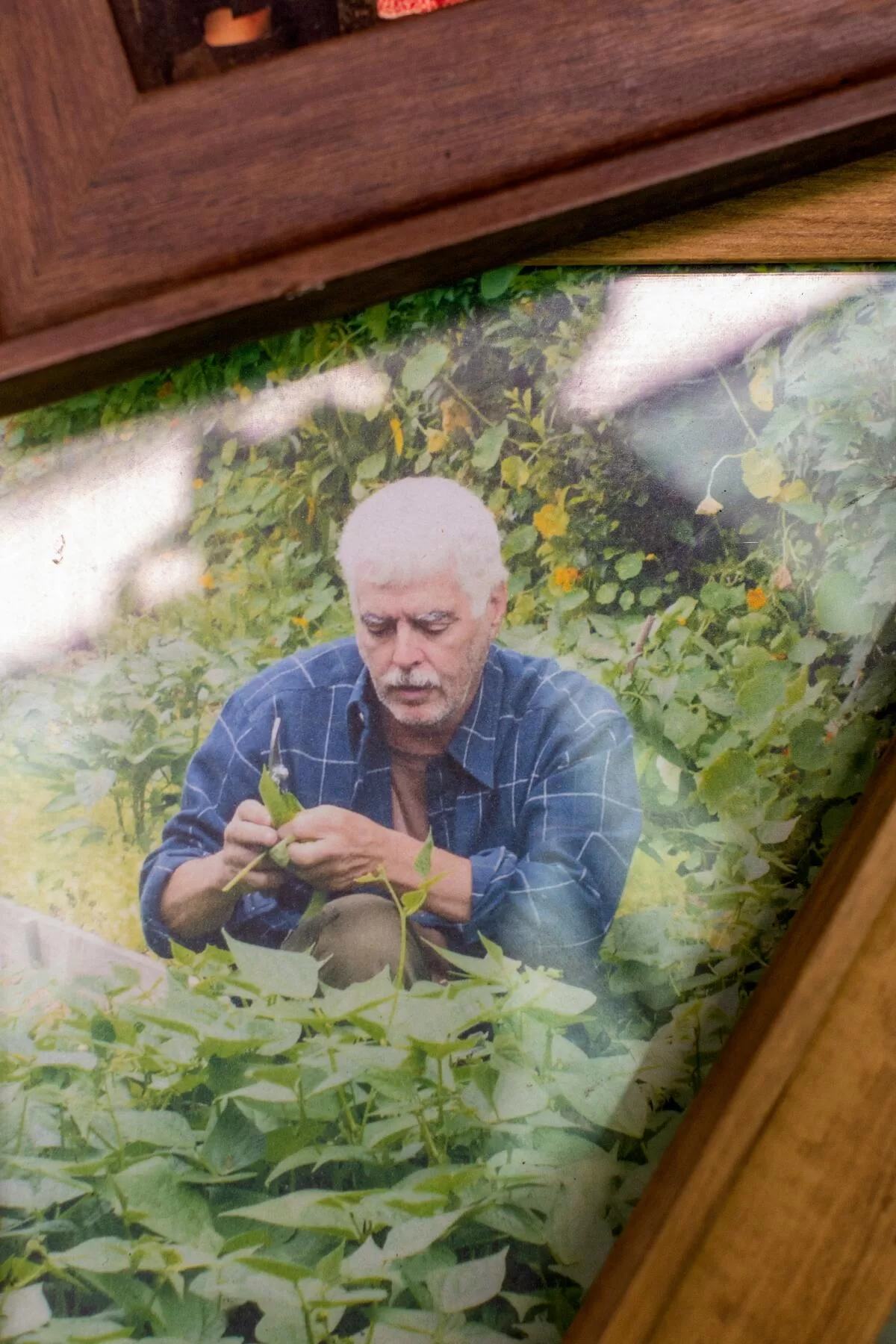In 1984, a determined back-to-earther named Jules Dervaes Jr. brought his wife and children from a 10-acre farm in rural Florida to study theology in Pasadena but ultimately decided on a different ministry: creating a self-sufficient urban farm on a rundown residential property less than a block from the 210 freeway.
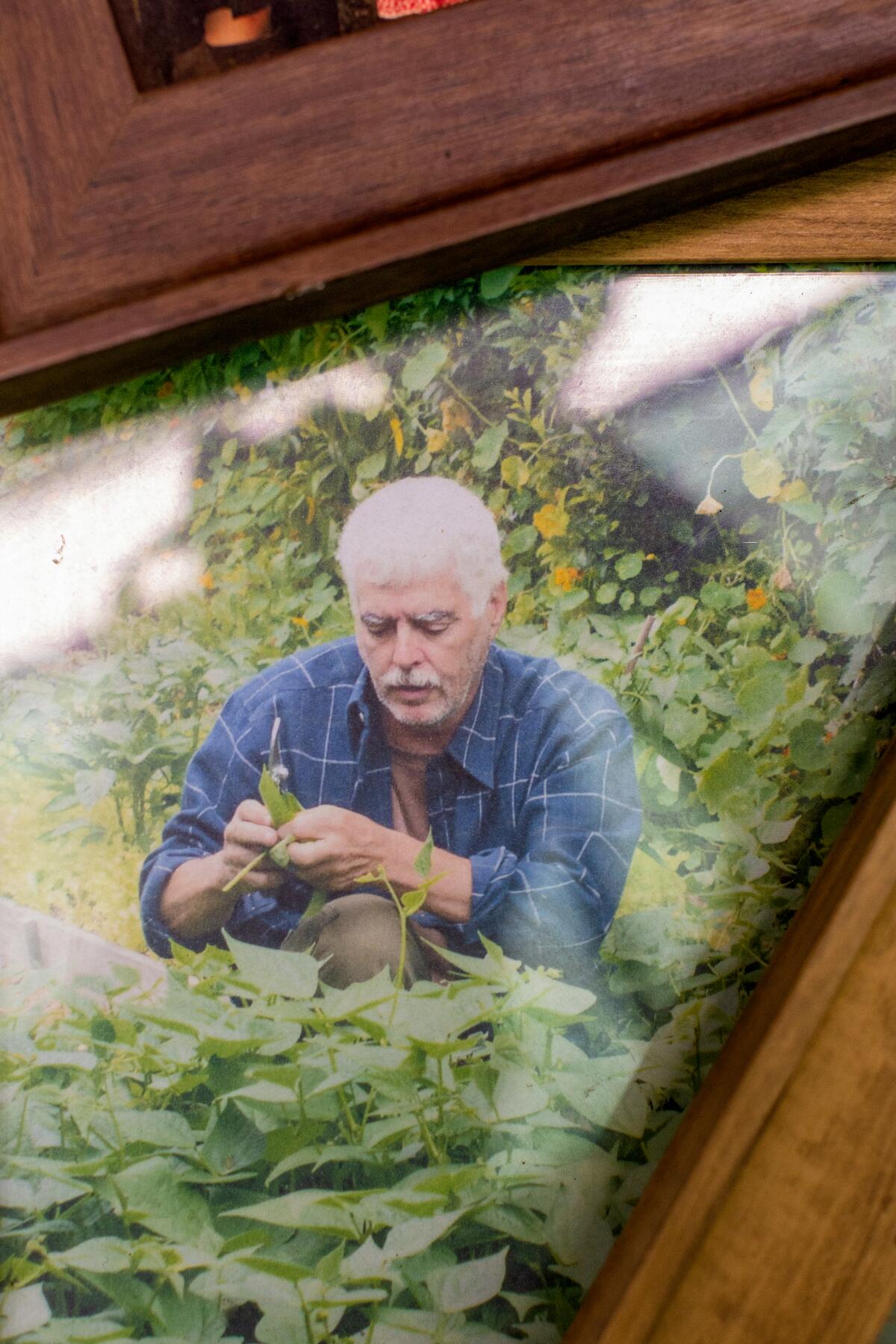
Jules Dervaes Jr. didn’t have a long-range plan when he started an organic farm in the front and back yards of his Pasadena home, but he did have a vision of creating a simpler life that his children continue today, nearly eight years after his death.
His wife left not long after — homesteading was not the life she signed up for — but his four children, now in their 40s, remained and today three of the four still work the farm known as the Urban Homestead, providing produce and flowers to more than 100 subscribing families every week, along with multiple restaurants and caterers.
“At first we were just gardening to grow food for our family, but then Dad took on organic gardening as a business,” said Anäis Dervaes, the eldest daughter. “In 1989, we took out our front yard — even the concrete — to grow more food, and our neighbors thought we were crazy, but the business took off, so you can make a living by removing your lawn.”
And, as all farmers know, working very hard.
Dervaes died in 2016 from a pulmonary embolism, but his children Anäis, 49, Justin, 46, and Jordanne, 41, keep building on his vision. Through the nonprofit Urban Homestead Institute established in 2001, they provide food boxes for needy families, offer internship positions to volunteers who want to help at the farm and welcome scores of schoolchildren to see how real food is grown — a program that started after Dervaes encouraged Anäis to try a new thing called blogging in 2000.
It was a time of big protests against genetically modified food, and Anäis wanted to join the demonstrators, “but Dad said, ‘What if we just write about what we’re doing here on a daily basis, living a simple life?’ And I think I said something like, ‘So I’ll write, ‘Today I harvested corn?’ Nobody is going to care about that.’”
But as it turned out, people did. The family got a following, and teachers from Compton High School wrote, asking if they could bring some students to tour their urban farm, “and we’ve been doing outreach with students ever since,” Anäis said.
Not as much as they’d like to, because space is at such a premium they can only accommodate small groups. The garage is now a small store and distribution center for food boxes. The covered patio is a place for classes, demonstrations and their homemade pizza oven. The driveway is lined with trays of plant and flower seedlings. Chickens and ducks live in a rustic L-shaped structure in the back and fruit trees line the property’s perimeter. The rest of the yard is filled with raised beds planted thickly with vegetables, herbs and flowers, accessible by narrow walking paths.
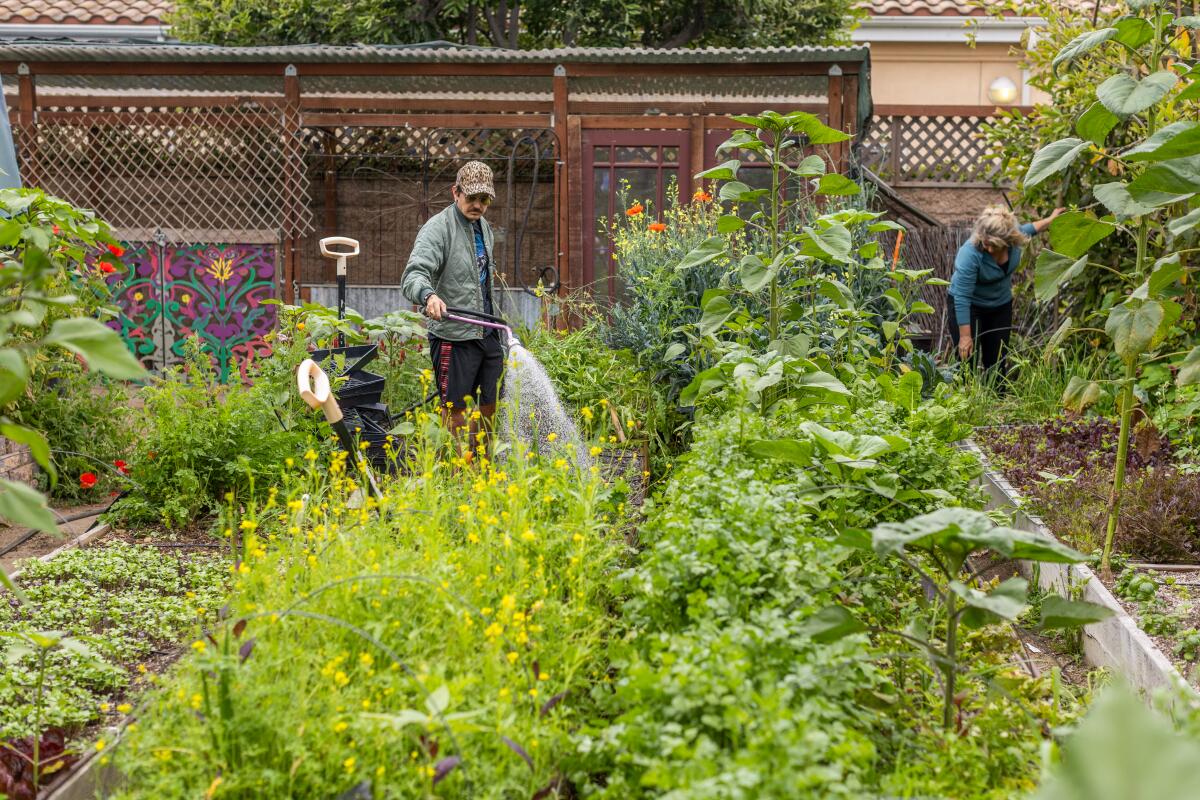
Volunteer and customer Tristan Lahoz, left, and Jordanne Dervaes tend to the densely planted beds at Urban Homestead.
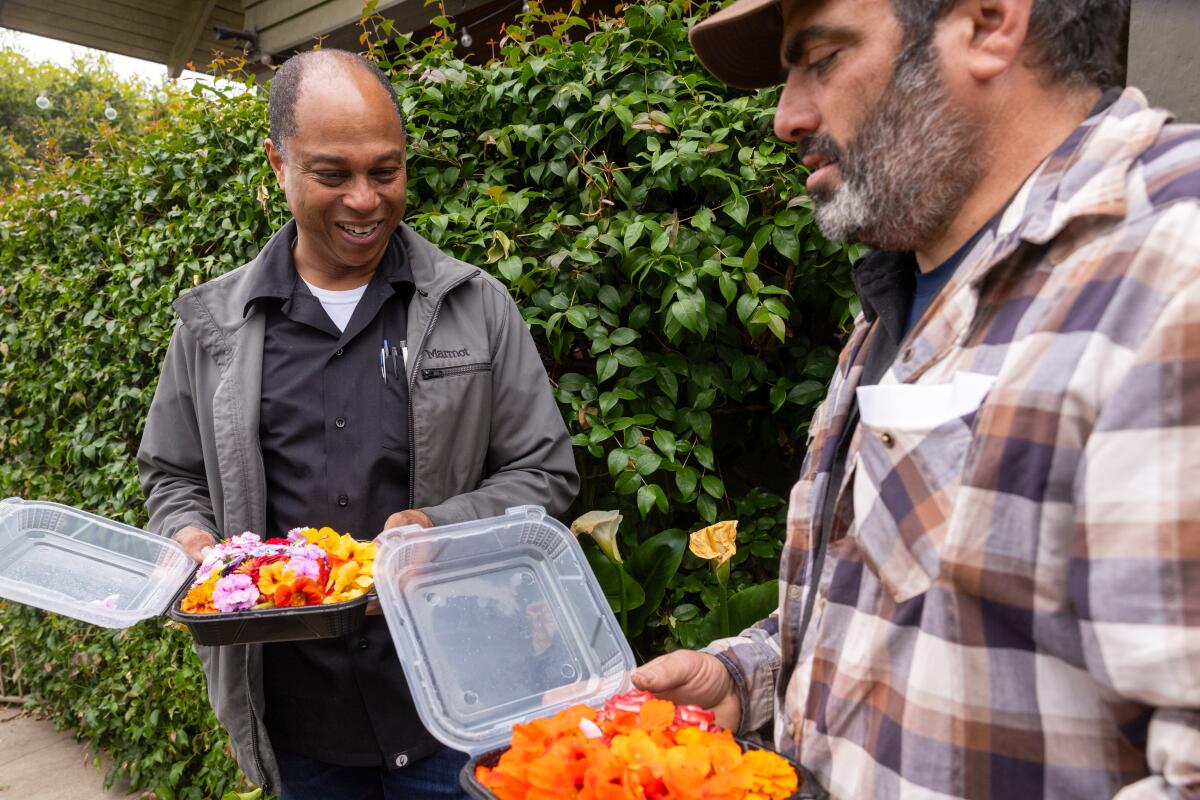
Chef Onil Chibas, left, picks up his order of edible flowers and salad greens from farmer Justin Dervaes.
But you don’t have to do much walking to see plenty at the Urban Homestead. Almost every bed has dense plantings of something — lettuces, spinach, arugula and red-stemmed dandelions (a zesty salad green) — embellished with sunflowers. There’s a big bin of compost-enriched soil where a handheld seed block contraption gets regular use, pressing out four uniform cubes of soil in one squeeze that can easily fill a tray and just as easily be planted once the seeds sprout and grow — a critical tool when you’re constantly harvesting and replanting.
The garden is busy with butterflies, bees and other beneficial insects, especially out front, where flowers are the predominant crop, a jungle of red Flanders poppies and fragrant sweet peas (for bouquets) and sunny nasturtiums, calendulas and roses (for eating).
Dervaes’ children aren’t getting rich, but they’re making a living, thanks to long hours, few expenses and the courage to experiment. The family installed solar panels back in 2003 and a greywater system that keeps their water bill under $1,000 a year. For a time they even recycled cooking oil from local restaurants to make their own biodiesel for their diesel truck, and in 2009, they made a short film called “Homegrown Revolution” that won awards at multiple film festivals.
A few years ago, they used a rent-to-buy plan to acquire a neighbor’s home two doors down and expanded their farm to its front yard. Jordanne, and Anäis live there now, while Justin lives in the main house, oversees the main farm operation and rents out a couple of the bedrooms.
Anäis calls herself the “cook and educator,” making products like jams and teaching workshops in knitting and other home skills. Jordanne, the youngest, oversees their bee hives (kept at another location) and their flock of chickens and ducks, a job she’s had since she was a child. All three do outside consulting on various aspects of gardening, homesteading and raising chickens, which led to Occidental College recruiting Jordanne to teach a popular class in regenerative gardening and sustainable animal care, with occasional input from her siblings. And just recently, Jordanne got her real estate license to pursue her interest in preserving old homes.
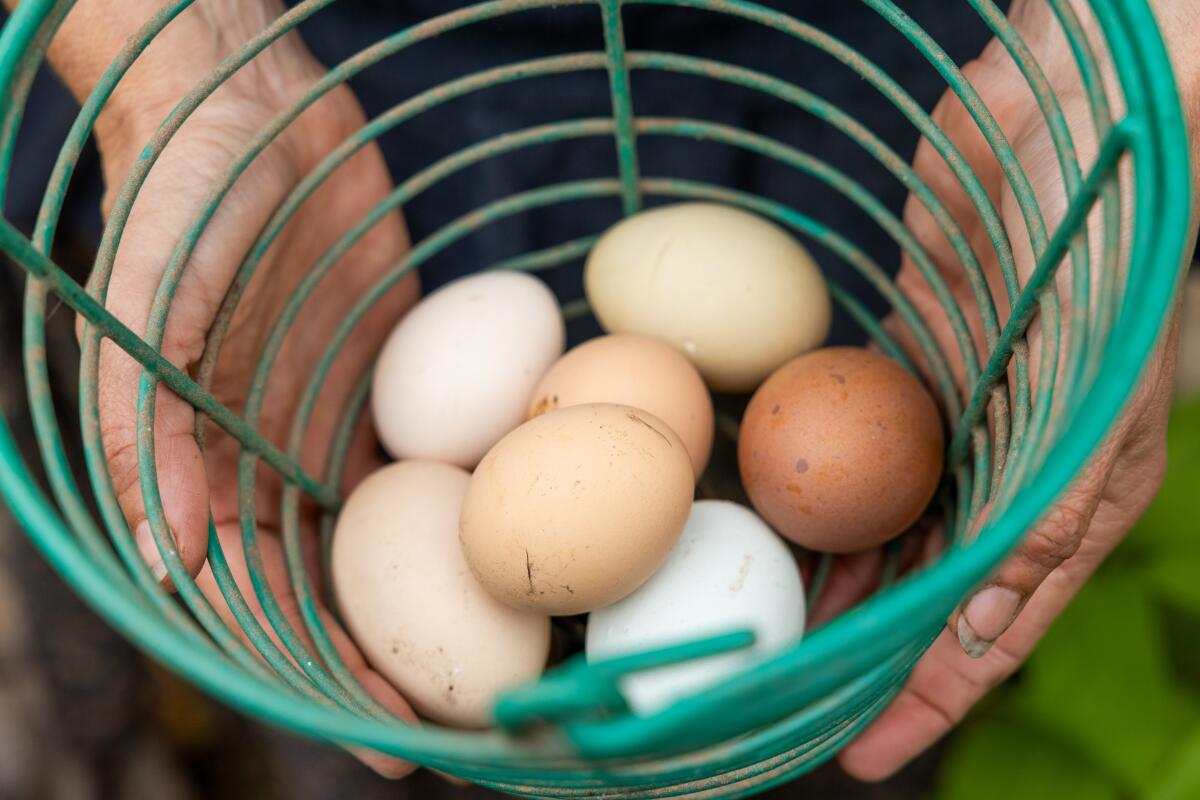
The Urban Homestead’s poultry eat much of the farm’s garden waste and provide plenty of nutrient-rich poop to feed the soil. Their eggs are an added bonus for the family.
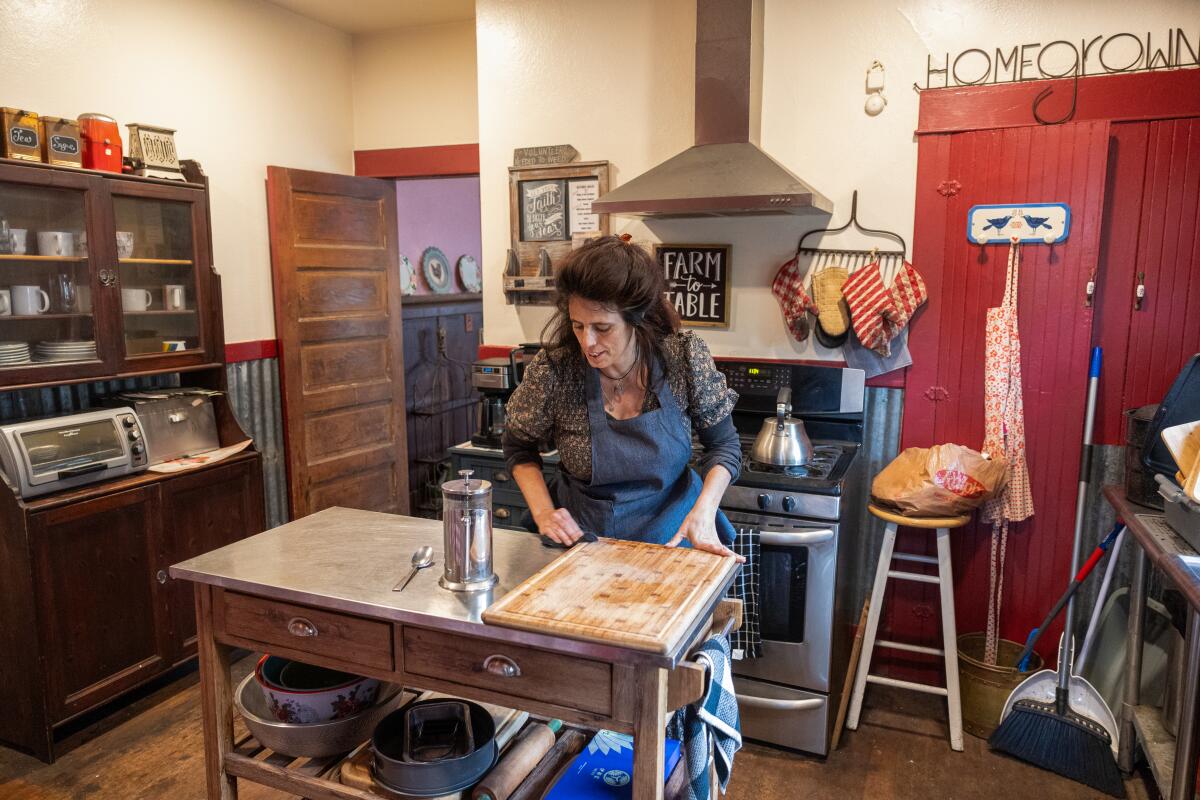
Anäis Dervaes tidies up the kitchen at her family’s house, built in 1917.
But the family farm is still their main focus, and it keeps them so busy that it interferes with their dating lives, said Anäis. All three are single and would like long-term relationships someday, but it’s hard to find people who share their priorities.
“The dating life is just something we haven’t mastered yet,” said Jordanne, laughing. “I can take on any challenge, but this one baffles me.”
Partly it’s time and partly it’s priorities, Anäis said, like when she gets frost warnings on her phone and has to cut a date short so she can run home to cover crops to protect them from damage.
“We live a farming lifestyle in the city, so we look at things different than most city dwellers, and they don’t always understand,” Anäis said. “But this is our livelihood; this is our life.”
It wasn’t always wonderful, she said. They became a vegetarian household when they were all very young, and as teenagers they all had moments of rebellion. They were homeschooled, but neighborhood kids taunted them about what they were missing — Nikes and hamburgers and sodas in a can.
“We were just granola kids, running around barefoot on the street, and I was feeling like I didn’t fit in,” said Anäis. “I’d say, ‘Dad, why do we have to shop at thrift stores? Why do we only eat out of the garden? Why don’t we eat normal stuff instead of Swiss chard?’”
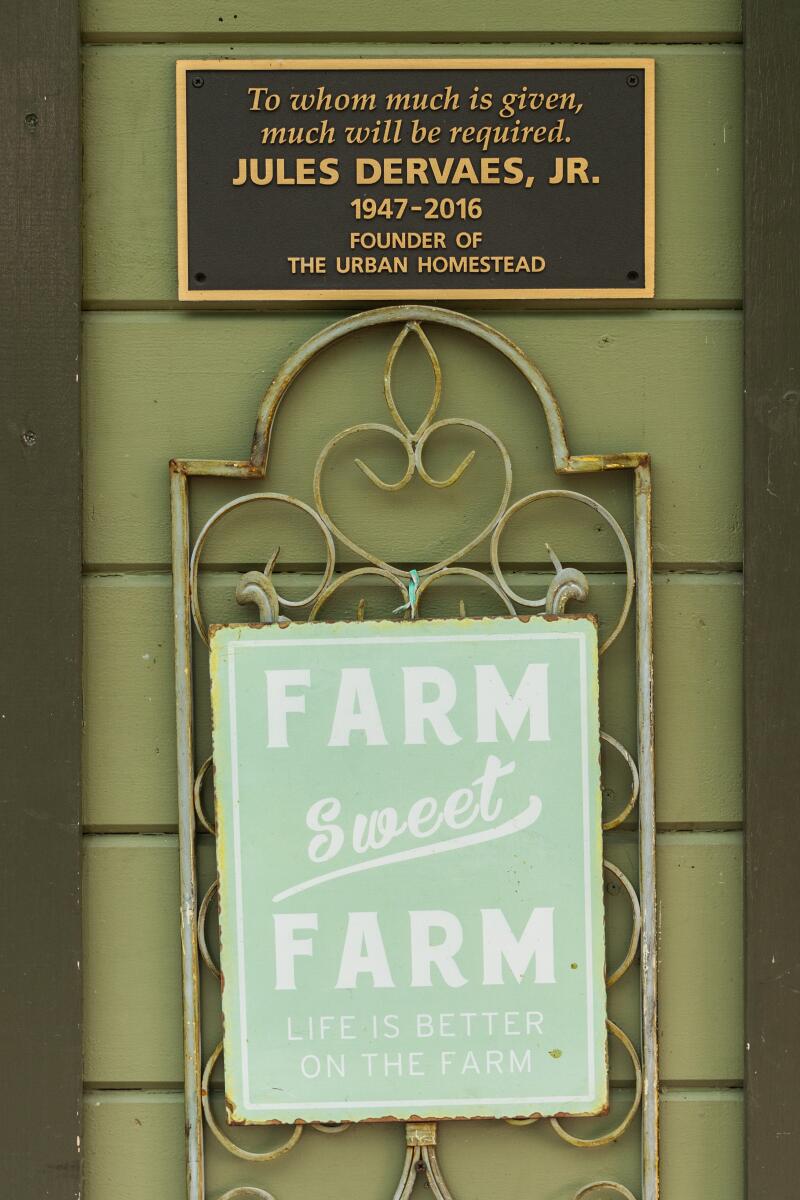
A plaque memorializes Jules Dervaes Jr.
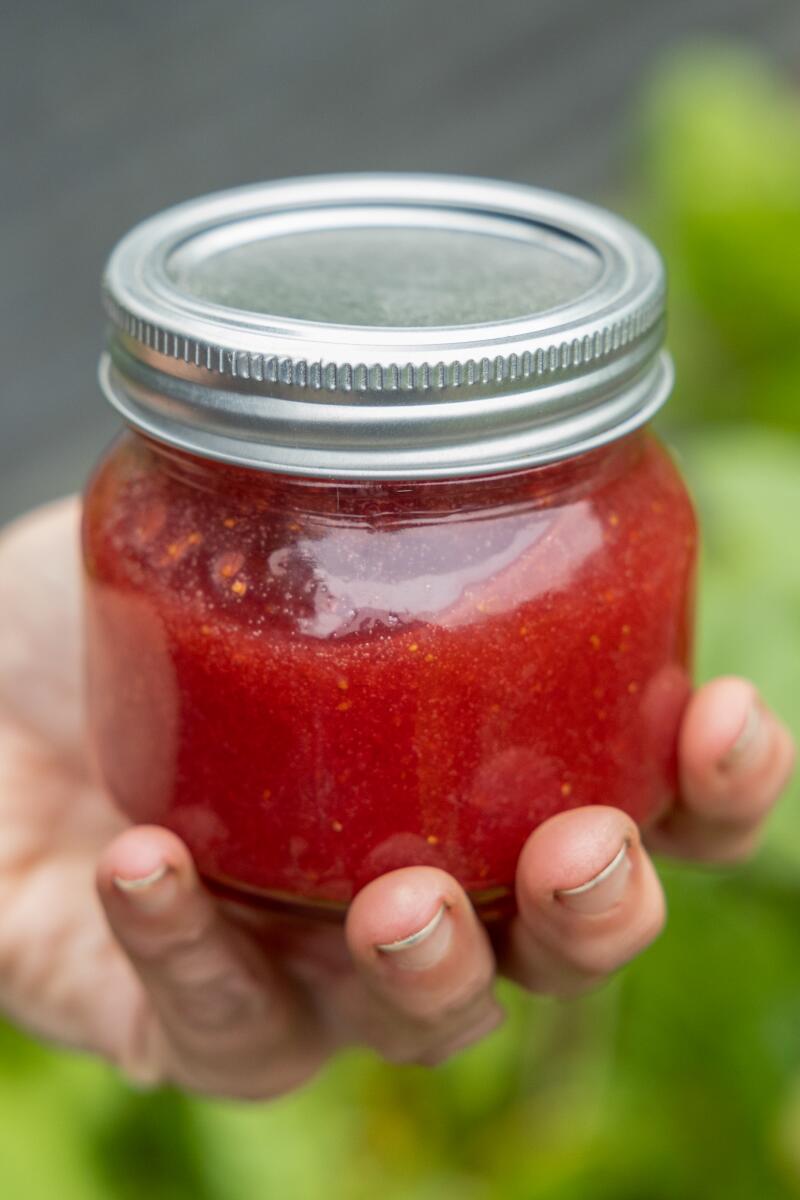
Handmade jams are available at Urban Homestead.
But once she read the book that inspired her father’s vegetarianism, John Robbins’ ”Diet for a New America,” “It was like a light bulb went off,” she said, “and this lifestyle became mine.”
It wasn’t like their father forced them to do what they didn’t want to do, Jordanne said. “We had a lot of pushback, but he always encouraged us to question everything in our lives,” she said. “And we had responsibilities. There was a sense of pride in growing all these plants, and the business was ours. Dad would always say, ‘If you want to do it, read about it and go do it.’ He challenged us to learn and do our own problem solving.”
There were some limits — Jordanne’s desire to have a horse and a cow just wasn’t possible — but ultimately, it was the freedom to experiment that drew them back whenever they strayed, Anäis said. “There was a sense of identity here, and family survival. It gave us purpose and a passion. I would plant on the moon if I had to.”
The farm is open to visitors the second Sunday of every month, during two-hour “Learning Tours” (tickets are $75). But Justin has a few tips for people who want to remove their lawn and become urban microfarmers — or just landscape with food.
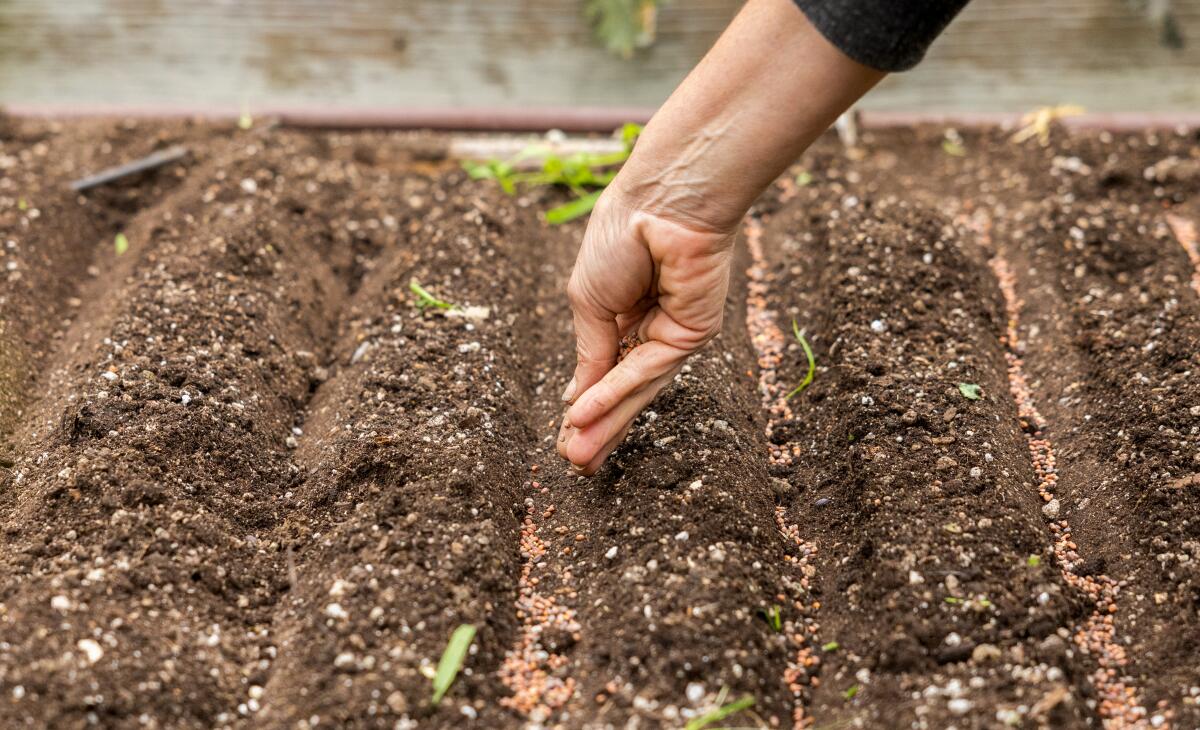
Salad mix seeds planted at Urban Homestead.
